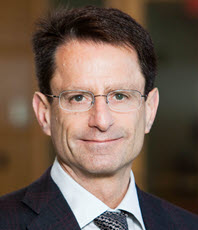
Scott M. Lippman, MD
Distinguished Professor of Medicine, FAS, UC San Diego, School of Medicine | Adjunct Professor at the MD Anderson Cancer Center

- Profile
- Course
Profile
Dr. Lippman received his medical degree from The Johns Hopkins University School of Medicine; is triple board-certified in internal medicine, medical oncology, and hematology; was Chair of Departments in Cancer Prevention and Medicine at MD Anderson Cancer Center; and UCSD Director of Moores Cancer Center, Associate Vice Chancellor for Cancer Research and Care, and Distinguished Professor of Medicine.
His translational/genomic copy number research and precision medicine investigator initiated trials in lung and head and neck-squamous cancer has been funded by NIH since 1990, including as PI (of 2 P01s, SPORE; 2 current NIH R01s, SU2C DreamTeam), published as first/senior author (in NEJM, JCO, PNAS; JAMA, Cell, Nature, AACR family), and recognized by three endowed Chairs. He received numerous awards (ACS, ASCO, MDACC, AACR), and was elected to the prestigious physician-scientist society, and the Association of American Physicians. He co-led (senior author; William, et al. PNAS 2021) the pivotal discovery of the cell intrinsic CN ‘switch’ on the short, p21.3, arm of chr9 that drives the pre cancer invasive disease, immune hot-to-cold tumor microenvironment transition, which in turn dictates anti PD-1/L1 immune checkpoint therapy resistance in HPV (the most common and lethal) head and neck-squamous cancer type, and its aggressive-precursor (ICT-IIT, NCT03692325; Hanna et al. JAMA Oncol 2024). This work ultimately revealed chr9p to be a uniquely singular immune-oncology gene hotbed, and top scoring TME-cold/CN parameter (across every possible whole chromosome/arm CN loss or gain). 9p/ICT resistance was confirmed by 10+ groups and translated to a CLIA approved standard genomic test to guide PD-1 axis ICT in HPV— HNSC.
Recently, Dr. Lippman co-developed (co-senior author/inventor; featured in J Clin Oncol 2024) breakthrough deep learning AI platform technology, applied directly to routine tissue slides, to eliminate delays and health inequities that have confounded the promise of precision oncology, and allow instantaneous, accurate, and fair access to standard clinically actionable genomic testing. An accompanying editorial (JCO, September 2024) highlighted this AI approach as the “next wave of precision medicine in oncology care” since its inception (25 years ago). A UCSD spinoff (and several 9p and AI patent filings) was created to accelerate translation and make precision therapy real for other genomic biomarkers, targets and patients worldwide.
He served as Chair of NIH CDP Study Section (and of ASCO, NCI, AACR, other national Committees, conferences, symposia, PCGA Think Tanks), was Editor-in-Chief for AACR journal (Cancer Prev Res) and FDA-ODAC, NCI Subcommittee A (and NCI Cooperative Group, CTAC, NCI Cancer Center/other EABs), elected Board of Director (AACR, AACI, NCCN and NAS), Engineering, Medicine and National Cancer Policy Forum member.
He has co-authored chapters in major medical textbooks (e.g., Cecil Medicine, Cancer Medicine, Cancer: Principles & Practice of Oncology editions), was faculty and Chair, ASCO-AACR Methods in Clinical Cancer Research Workshops and is well respected clinically, with recognitions in “Top Doctor” listings. He also teaches medical and graduate student courses in UCSD School of Medicine and serves on PhD/thesis committees.
Dr. Lippman is teaching an immune-oncology course in this MAS program with Dr. Cohen, a former UCSD Chief of Hematology/Oncology, now CSO at a major molecular profiling company. Dr. Cohen also holds an adjunct UCSD professorship and continues to see patients at Moores Cancer Center, both national leaders in the IO field.
